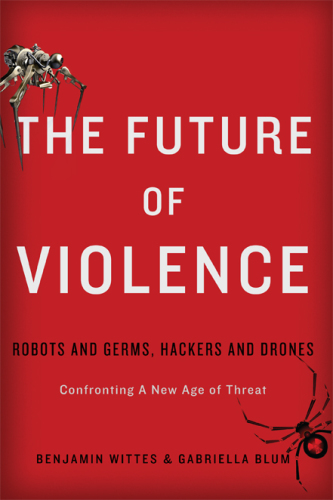
The Future of Violence
Robots and Germs, Hackers and Drones?Confronting A New Age of Threat
کتاب های مرتبط
- اطلاعات
- نقد و بررسی
- دیدگاه کاربران
نقد و بررسی

January 15, 2015
Ambitious yet dry treatise regarding a particular terror of modern life: the increasing ubiquity of potential harm spawned by technological transformations. Brookings Institution senior fellow Wittes and Blum (Human Rights and International Humanitarian Law/Harvard Law School; Islands of Agreement: Managing Enduring Armed Rivalries, 2007, etc.) begin by articulating the many ways in which our fundamental connectedness, along with related advances in computing, biotechnology, 3-D printing, gene synthesis and other awe-inspiring technologies, could easily go awry or be turned to evil ends by lone sociopaths or wannabe jihadi: "Technologies that put destructive power traditionally confined to states in the hands of small groups and individuals have proliferated remarkably far," write the authors. They initially focus on the destructive possibilities of technologies that have quickly become familiar, hypothesizing, for example, that ordinary people will soon be able to harass their rivals with tiny drones. In our transformative moment, "distance does not protect you...you are at once a figure of great power and great vulnerability." Yet much of the authors' discussion focuses on the changing nature of the state itself, weighing Hobbes' concept of the "Leviathan" in the face of new and diverse threats. They first focus on how technology has "distributed" both vulnerability and the capacity to cause harm widely: "[W]e live in a fishbowl even as we exploit the fact that others live in a fishbowl too," a principle embodied by recent "sextortion" cases. This inevitably forces a reconsideration of privacy and liberty on many levels, as revealed by events ranging from the Boston Marathon bombing investigation to hacker attacks on Israel and Iran. The authors raise fascinating questions but discuss them utilizing a formal legalistic framework. Ironically, they illuminate the coming age of "many-to-many" threats via a language few laypeople will find comprehensible. A thoughtful yet obscure Cassandra warning of great vulnerabilities disguised as gifts.
COPYRIGHT(2015) Kirkus Reviews, ALL RIGHTS RESERVED.

February 1, 2015
Wittes (senior fellow, governance studies, Brookings Institution; Campaign 2012) and Blum (Rita E. Hauser Professor of Human Rights and Humanitarian Law, Harvard Law Sch.; Islands of Agreement), who codirect the Harvard Law School-Brookings Project on Law and Security, introduce readers to the new and upcoming threats to security, privacy, and health in the 21st century, which are often enabled by low-cost, advanced technology. With ready access to drone technology, nano-tech, and biological tools and information, these threats are situated in a political economy of the role of the state, private citizens, and nonstate actors. What Wittes and Blum set out to do is provide instructive possible actions that government may be poised to take, and others in which government players may not yet have ample guidelines to address. A case in point revolves around civilian drone use by political activists for environmental monitoring. What the authors achieve in this work is to raise the profile of issues at the intersection of biology, technology, and government policy. Posing the challenges to safety now, before the technologies have matured, will give law and policymakers a head start on some of the issues they raise, while others--such as health monitoring of virulent diseases--have already made waves globally. VERDICT Recommended to readers of governmental policy and the ethics of technology, who will be especially interested in this timely work.--Jim Hahn, Univ. Lib., Univ. of Illinois, Urbana
Copyright 2015 Library Journal, LLC Used with permission.

























دیدگاه کاربران